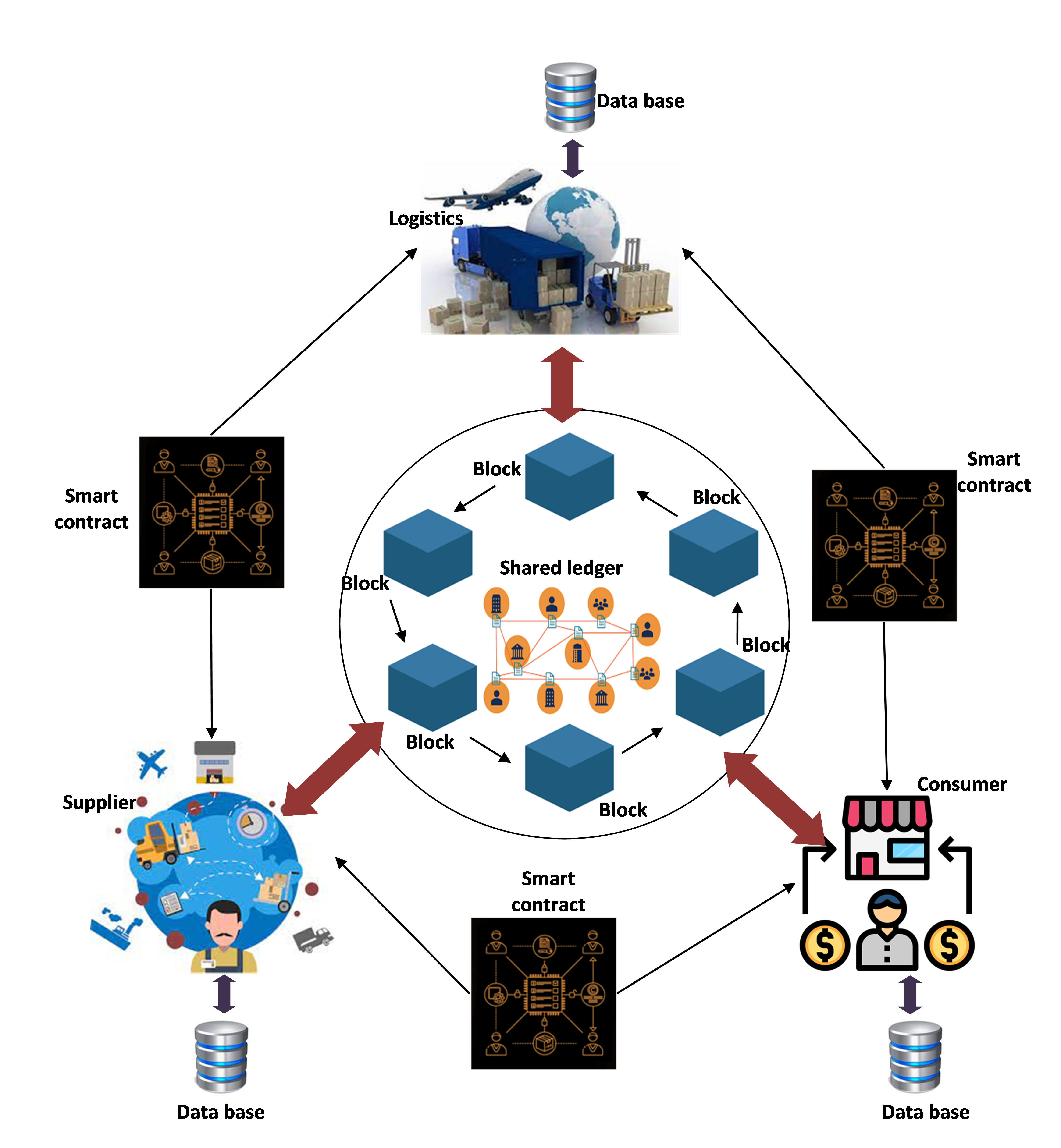Block Chain based Contribute Sequence Tracking System for Secure Data Ascription Management
Main Article Content
Abstract
Block chain technique is developed from a distributed, dependable application development platform to an irreversible record of crypto currency transaction history. Block chain technology's emergence has sparked a number of possible changes in how corporate operations are managed across numerous industries. However, to the best of research experience, no prior effort has concentrated on integrating block chain to establish a secure and unchangeable data and evidence attribution maintenance architecture that autonomously checks the origination records. Therefore, the research work proficiently introduces the novel Block Chain based Contribute Sequence Tracking (BCCST) system with amalgamation of Trail based Smart Indenture (TSI) and Release Attribution Model (RAM). The study begins by outlining a practical application of the proposed TSI for the disintermediation of commercial activities utilising a notional, shared information ledger. This ledger not only makes monitoring data exchange easier, but it also encourages supply chain participants to cooperate together on a multilateral network. The novel RAM to create immutable data trails that make it easier to gather, maintain, and verify reliable data provenance.
Article Details
References
. Ahl, A., Yarime, M., Tanaka, K. & Sagawa, D. (2019). Review of blockchain-based distributed energy: Implications for institutional development. Renewable and Sustainable Energy Reviews. 107: 200-211. https://doi.org/10.1016/j.rser.2019.03.002.
. Banalieva, E. R., Cuervo-Cazzura, A. &Sarathy, R (2018). Dynamics of pro-market institutions and firm performance. Journal of International Business Studies. 49: 858- 880. https://doi.org/10.1057/s41267-018-0155-7.
. Bohme, R., Christin, N., Edelman, B. & Moore, T. (2015). Bitcoin: Economics, technology and governance. Journal of Economic Perspectives. 29(2): 213-238. DOI: 10.1257/jep.29.2.213.
. Gadde, S. ., & Chakravarthy, A. S. N. . (2023). Novel and Heuristic MolDoc Scoring Procedure for Identification of Staphylococcus Aureus. International Journal of Intelligent Systems and Applications in Engineering, 11(2s), 125 –. Retrieved from https://ijisae.org/index.php/IJISAE/article/view/2516
. Cruz Jason, Paul and Kaji Yuichi. 2015. The Bitcoin Network as Platform for Trans-Organizational Attribute Authentication. IPSJ SIG Notes 2015, 12 (feb 2015), 1–6. http://ci.nii.ac.jp/naid/110009877764/en/
. The Economist. 2016. Better with bitcoin. (2016). http://www.economist.com/news/science-and-technology/21699099- blockchain-technology-could-improve-reliability-medical-trials-better.
. Brophy, R. (2020). Blockchain and insurance: A review of operations and regulation. Journal of Financial Regulation and Compliance. 28(2): 215-234. https://doi.org/10.1108/JFRC-09-2018-0127.
. Bruton, G. D., Lau, C.-M. &Oboj, K. (2014). Institutions, resources and firm strategies: A comparative analysis of entrepreneurial firms in three transition economies. European Journal of International Management. 8(6): 697-719. https://doi.org/10.1504/EJIM.2014.064905.
. Cai, L., Sun, Y., Zheng, Z., Xiao, J. &Qiu, W. (2021). Blockchain in China. Communications of the ACM, November 2021, 64(11): 88-93
. Carter, N. (2021). How much energy does bitcoin actually consumer? Harvard Business Review. Retrieved from https://hbr.org/2021/05/how-much-energy-doesbitcoin-actually-consume.
. Albeshr, S. &Nobanee, H. (2020). Blockchain applications in banking industry: A minireview. SSRN working paper. Retrieved from https://papers.ssrn.com/sol3/papers.cfm?abstract_id=3539152.
. Chang, V., Baudier, P., Zhang, H., Xu, Q., Zhang, J. &Arami, M. (2020). How blockchain can impact financial services – the overview, challenges, and recommendations from expert interviewees. Technological Forecasting and Social Change. 158. 1- 10. https://doi.org/10.1016/j.techfore.2020.120166.
. Chen, Y. &Bellavitis, C. (2020). Blockchain disruption and decentralized finance; The rise of decentralized business models. Journal of Business Venturing Insights. 13. E00151. https://doi.org/10.1016/j.jbvi.2019.e00151.
. Chen, Y. &Bellavitis, C. (2019). Decentralized finance: Blockchain technology and the quest for an open financial system. SSRN. Retrieved from https://papers.ssrn.com/sol3/papers.cfm?abstract_id=3418557.
. Chen, L. & Yang, W. (2019). R&D tax credits and firm innovation: Evidence from China. Technological Forecasting and Social Change. 146: 233-241. https://doi.org/10.1016/j.techfore.2019.05.018.
. Chiu, J. &Koeppl, T. (2017). The economics of cryptocurrencies – bitcoin and beyond. SSRN working paper. Retrieved from https://papers.ssrn.com/sol3/papers.cfm?abstract_id=3048124.
. Carney, M., Gedajilovic, E. & Yang, X. (2009). Varieties of Asian capitalism: Toward an institutional theory of Asian enterprise. Asia Pacific Journal of Management. 26: 361-380. https://doi.org/10.1007/s10490-009-9139-2.
. Choi, T.-M. (2020). Creating all-win by blockchain technology in supply chains: Impacts of agents’ risk attitudes towards cryptocurrency. Journal of Operational Research Society. 2020, 1-9. https://doi.org/10.1080/01605682.2020.1800419.
. Liu, X., Barenji, A.V., Li, Z., Montreuil, B. and Huang, G.Q., 2021. Blockchain-based smart tracking and tracing platform for drug supply chain. Computers & Industrial Engineering, 161, p.107669.
. Omar, I.A., Debe, M., Jayaraman, R., Salah, K., Omar, M. and Arshad, J., 2022. Blockchain-based Supply Chain Traceability for COVID-19 personal protective equipment. Computers & Industrial Engineering, 167, p.107995.
. Musamih, A., Salah, K., Jayaraman, R., Arshad, J., Debe, M., Al-Hammadi, Y. and Ellahham, S., 2021. A blockchain-based approach for drug traceability in healthcare supply chain. IEEE access, 9, pp.9728-9743.
. Hasan, H.R., Salah, K., Jayaraman, R., Ahmad, R.W., Yaqoob, I. and Omar, M., 2020. Blockchain-based solution for the traceability of spare parts in manufacturing. IEEE Access, 8, pp.100308-100322.
. Wang, L., Xu, L., Zheng, Z., Liu, S., Li, X., Cao, L., Li, J. and Sun, C., 2021. Smart contract-based agricultural food supply chain traceability. IEEE Access, 9, pp.9296-9307.
. Sunny, J., Undralla, N. and Pillai, V.M., 2020. Supply chain transparency through blockchain-based traceability: An overview with demonstration. Computers & Industrial Engineering, 150, p.106895.

